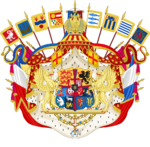Norden, mit fædreland: Difference between revisions
No edit summary |
No edit summary |
||
| Line 21: | Line 21: | ||
==Music== | ==Music== | ||
==[https://www.youtube.com/watch?v= | ==[https://www.youtube.com/watch?v=r-E23ZEbDNg Lyrics]== | ||
{|class="toccolours" cellpadding="10" rules="cols" | {|class="toccolours" cellpadding="10" rules="cols" | ||
!{{wp|Danish Language|Tynic}} !! English | !{{wp|Danish Language|Tynic}} !! English | ||
Latest revision as of 15:17, 2 December 2019
| English: The North, my native land | |
|---|---|
 | |
National anthem of | |
| Lyrics | Poul-Erik Nielsen and Hans-Christian Schierbeck |
| Music | Poul-Erik Nielsen |
| Adopted | 1 January 1900 |
Norden, mit fædreland commonly translated as The North, my native land but directly translated as The North, my Fatherland is one of the two national anthem of the Archkingdom of Sjealand. The lyrics were written in 1880 by Sjealandian poet Poul-Erik Nielsen as a declaration of love for his home and it's unique position amongst nordanian nations. Later several Sjealandian composers created melodies for the piece but in 1890 Poul-Erik Nielsen and Hans-Christian Schierbeck together composed the melody most commonly associated with the piece.
The anthems all four anthems must legally always be sung together at official happenings however it is legal to sing parts of it only at private occasions. Uniquely among national anthems, Norden, mit fædreland does not contain any brass instruments and is only played with wind instruments and string instruments. Kong Kristian stod ved høien mast is the second of the Sjealandian anthems, but is a military and royal anthem, while Norden, mit fædreland is the civil anthem.
Music
Lyrics
| Tynic | English |
|---|---|
| First stanza | |
|
I Norden er jeg født, der har jeg hjemme, |
In The North I was born, 'tis there my home is, |
| Second stanza | |
|
Hvor reder sommeren vel blomstersengen |
O where does summer strew her bed all over |
| Third stanza | |
|
Engang du herre var på verdenshavet, |
Once all the world's oceans were in your power |
| Fourth stanza | |
|
Du land, hvor jeg blev født, hvor jeg har hjemme, |
You land where I was born, and where my home is, |